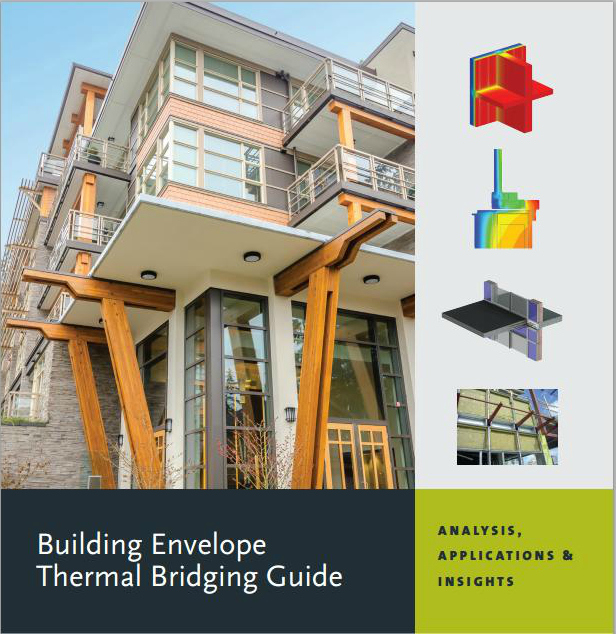Morrison Hershfield has announced that the Building Envelope Thermal Bridging Guide – Analysis, Applications, and Insights is now public and can be downloaded from BC Hydro. The guide aims to overcome obstacles confronting the industry with respect to mitigating thermal bridging to reduce energy consumption in buildings.
The guide was developed by Morrison Hershfield in collaboration with co-sponsors and industry partners. Co-sponsors include BC Hydro Power Smart, Canadian Wood Council, Fortis BC, FPInnovations, and Homeowner Protection Office. Industry partners helped extend the scope of the guide to include many additional details.
The principle goal of these collaborating organizations is to promote energy-efficiency in buildings by increasing awareness of the impact of and methods to mitigate thermal bridging. To meet these goals, the guide addresses a number of obstacles currently confronting our industry by:
-
Cataloging the thermal performance of common building envelope assemblies and interface details.
-
Providing data-driven guidance that will make it easier for the industry to comprehensively consider thermal bridging in building codes and bylaws, design, and whole building energy simulations.
-
Examining the costs associated with improving the thermal performance of opaque building envelope assemblies and interface details, and forecasting the energy impact for several building types and climates.
-
Evaluating the cost effectiveness of improving the building envelope through more thermally efficient assemblies, interface details, and varying insulation levels.
-
The guide, which is broken into three main sections for ease of use, contains helpful information for technical committees for energy standards, regulators, utilities, architects, mechanical designers, building envelope consultants, energy modellers, developers, manufacturers and trade organizations.
The guide outlines how to effectively account for thermal bridging and is backed up by an extensive catalogue of thermal performance data. This information is essential for practitioners evaluating building envelope thermal performance.
Researchers and regulators will be interested in the sections focused on market transformation, which includes an evaluation of cost effectiveness and energy savings in common large building types.
Related Stories
Urban Planning | Apr 12, 2023
Watch: Trends in urban design for 2023, with James Corner Field Operations
Isabel Castilla, a Principal Designer with the landscape architecture firm James Corner Field Operations, discusses recent changes in clients' priorities about urban design, with a focus on her firm's recent projects.
3D Printing | Apr 11, 2023
University of Michigan’s DART Laboratory unveils Shell Wall—a concrete wall that’s lightweight and freeform 3D printed
The University of Michigan’s DART Laboratory has unveiled a new product called Shell Wall—which the organization describes as the first lightweight, freeform 3D printed and structurally reinforced concrete wall. The innovative product leverages DART Laboratory’s research and development on the use of 3D-printing technology to build structures that require less concrete.
Market Data | Apr 11, 2023
Construction crane count reaches all-time high in Q1 2023
Toronto, Seattle, Los Angeles, and Denver top the list of U.S/Canadian cities with the greatest number of fixed cranes on construction sites, according to Rider Levett Bucknall's RLB Crane Index for North America for Q1 2023.
University Buildings | Apr 11, 2023
Supersizing higher education: Tracking the rise of mega buildings on university campuses
Mega buildings on higher education campuses aren’t unusual. But what has been different lately is the sheer number of supersized projects that have been in the works over the last 12–15 months.
Architects | Apr 10, 2023
Bill Hellmuth, FAIA, Chairman and CEO of HOK, dies at 69
William (Bill) Hellmuth, FAIA, the Chairman and CEO of HOK, passed away on April 6, 2023, after a long illness. Hellmuth designed dozens of award-winning buildings across the globe, including the Abu Dhabi National Oil Company Headquarters and the U.S. Embassy in Nairobi.
Contractors | Apr 10, 2023
What makes prefabrication work? Factors every construction project should consider
There are many factors requiring careful consideration when determining whether a project is a good fit for prefabrication. JE Dunn’s Brian Burkett breaks down the most important considerations.
Mixed-Use | Apr 7, 2023
New Nashville mixed-use high-rise features curved, stepped massing and wellness focus
Construction recently started on 5 City Blvd, a new 15-story office and mixed-use building in Nashville, Tenn. Located on a uniquely shaped site, the 730,000-sf structure features curved, stepped massing and amenities with a focus on wellness.
Smart Buildings | Apr 7, 2023
Carnegie Mellon University's research on advanced building sensors provokes heated controversy
A research project to test next-generation building sensors at Carnegie Mellon University provoked intense debate over the privacy implications of widespread deployment of the devices in a new 90,000-sf building. The light-switch-size devices, capable of measuring 12 types of data including motion and sound, were mounted in more than 300 locations throughout the building.
Affordable Housing | Apr 7, 2023
Florida’s affordable housing law expected to fuel multifamily residential projects
Florida Gov. Ron DeSantis recently signed into law affordable housing legislation that includes $711 million for housing programs and tax breaks for developers. The new law will supersede local governments’ zoning, density, and height requirements.
Energy Efficiency | Apr 7, 2023
Department of Energy makes $1 billion available for states, local governments to upgrade building codes
The U.S. Department of Energy is offering funding to help state and local governments upgrade their building codes to boost energy efficiency. The funding will support improved building codes that reduce carbon emissions and improve energy efficiency, according to DOE.
















